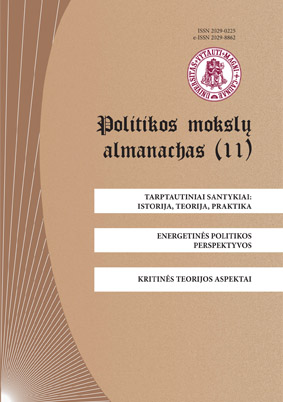Kolizijos Pietryčių Europoje: tarptautiniai santykiai, užsienio jėgų interesai ir „Albanų klausimas“
The Southeasten Europe in International Relations, the Interest of the Foreign Powers in the Region and the “Albanian Question”
Author(s): Vladislav B. SotirovićSubject(s): Politics / Political Sciences
Published by: Vytauto Didžiojo Universitetas
Keywords: Europa; Balkanai; tarptautiniai santykiai; Europe; Balkans; international relations
Summary/Abstract: XX a. pradžioje Europos didžiosios jėgos, pasidalijusios į du visiškai antagonistinius polinius-karinius aljansus, ruošėsi galutinai suvesti sąskaitas. Kalbama apie naują politinių-ekonominių sferų įtakos pasidalijimą ir kolonijų perskirstymą pasaulyje. Aljansų interesai susikirto Pietryčių Europos teritorijoje, daug labiau nei kitose pasaulio dalyse, pirmiausia dėl regiono gamtinių išteklių ir karinės-strateginės svarbos kaip esminio Rytų Viduržemio karinio užnugario ir tarpininkės tarp Centrinės Europos ir Artimųjų Rytų. Vokietijos keliai Bagdado link, Austrijos–Vengrijos ir Italijos – Salonikų link, Rusijos – Konstantinopolio link ėjo per Balkanus. Prancūzija ir Didžioji Britanija kaip tik siekė regione išsaugoti status quo (faktinę padėtį). Berlynui ir Vienai buvo daugiau nei akivaizdu, kad kelias į naftos telkinius Artimuosiuose Rytuose eina per Europos Balkanus. The article deals with the geo-strategic importance of the Balkans in international relations at the end of the XIX c. and the beginning of the XX c. with the focus on the “Albanian Question”. There are two research tasks of the article: 1. to investigate the geo-political and economic interests in the Balkans by six European Great Powers (Germany, Austria-Hungary, Italy, france, Great Britain and Russia) at the end of the 19th and the beginning of the 20th century; and 2. to examine the politics of the Great European Powers towards the “Albanian Question” at the Balkans at the turn of the 20th century. The Balkans is a term connoting peoples, cultures and states that make up a peninsula of Southeastern Europe between the Black, Adriatic, Aegean and Mediterranean Seas. There are three crucial points of the Balkan’s significance in geo-strategic point of view: 1) the territory of the Balkans is important connection between the Western/Central Europe and the Near/Middle East, 2) wealthy of region’s natural resources, and 3) the region which is located betwixt the Danube, the Black Sea and the Eastern Mediterranean is important part of Great European Powers’ political-military-economic strategy. Albanians, who believe themselves to be the last pure descendants of ancient Illyrians, the region’s inhabitants before the arrival of the South Slavs, were constantly on the road of interests of the regional big powers and nations: the Roman empire, the Byzantium, the Slavs, Ottoman Empire, the Habsburg Monarchy, etc. This fact had extremely negative consequences for creation of independent national state of Albanians throughout history. Historically, the first attempt to create Albanian state was done in the 13th century by Carlo I of Neapels who proclaimed himself as the king of Albania. However, the first real creator of independent state of Albania became the legendary Skanderbeg, “the father of Albanian nation”, who established Albanian independence on November 28th, 1443.
Journal: Politikos mokslų almanachas
- Issue Year: 2012
- Issue No: 11
- Page Range: 7-33
- Page Count: 27
- Language: Lithuanian

